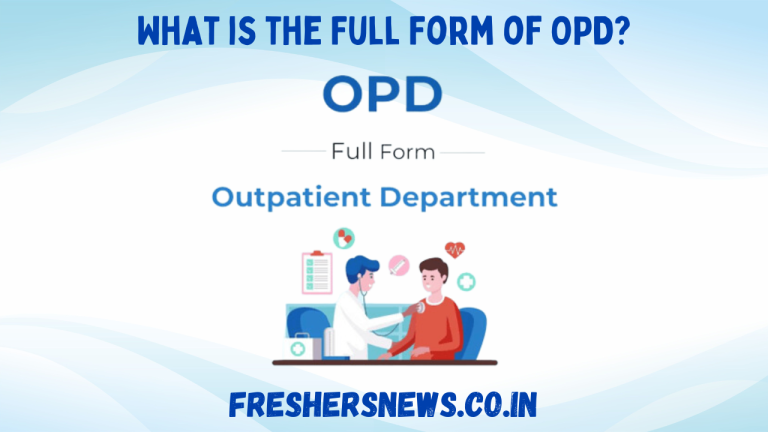What is the Full Form of OPD? It is the “Outpatient Department.” The term “outpatient” refers to a patient not required to be admitted to a hospital or clinic for treatment. The term “department” refers to a specific section of the hospital or clinic where patients are treated. This article will explore the full form of OPD and its significance in healthcare.

We are discussing What is the Full Form of OPD:
Introduction to OPD
The Outpatient Department (OPD) is an important department in any healthcare facility, whether it is a hospital, clinic, or medical center. It is the section of the hospital where patients are seen and treated without being admitted to the hospital.
Significance of OPD in Healthcare
The OPD plays a crucial role in healthcare. It serves as the first point of contact between patients and healthcare providers. Patients come to the OPD for various reasons, such as to seek medical advice, get a prescription refill, or receive treatment for a minor illness or injury.
In addition, the OPD provides a range of services, including medical consultations, diagnostic tests, and outpatient surgeries. Patients who require more specialized care are referred to other departments or specialists within the hospital.
The OPD is also responsible for maintaining patient records and keeping track of appointments. This is important for ensuring continuity of care and providing patients with the best possible treatment.
Components of the OPD
The OPD comprises several components, each of which plays a specific role in patient care. These components include:
- Reception and Registration
The first point of contact between patients and the hospital is the reception and registration desk. Here, patients are registered and provided with a unique identification number. This number keeps track of the patient’s medical records and appointments.
- Medical Consultation
The medical consultation is the core component of the OPD. Patients are seen by doctors or other healthcare professionals who assess their medical condition and provide appropriate treatment or advice.
- Diagnostic Services
The OPD provides various diagnostic services, including laboratory tests, X-rays, and ultrasound scans. These services help healthcare providers accurately diagnose medical conditions.
- Pharmacy
The pharmacy is an essential component of the OPD. Here, patients can obtain medications prescribed by their healthcare provider.
- Minor Procedure Room
The minor procedure room is used for outpatient procedures that do not require hospital admission. These include wound dressings, injections, and minor surgeries.
FAQs about OPD
What services are provided in the OPD?
The OPD offers a wide range of medical services, including:
- Consultations with doctors and specialists
- Diagnostic tests such as blood tests, X-rays, and ultrasounds
- Minor procedures like wound dressing and vaccinations
- Prescription of medications and follow-up care
How does the OPD function?
The OPD operates during specific hours, usually on weekdays, although some facilities may offer limited services on weekends and holidays. Patients typically register at the OPD reception, where they may be assigned a consultation time or directed to relevant departments based on their medical needs.
Who can visit the OPD?
The OPD is open to individuals of all ages seeking medical attention for non-emergency conditions. Patients may visit the OPD for preventive care, treatment of acute illnesses, management of chronic conditions, and post-operative follow-up care.
What are the benefits of the OPD?
The OPD provides several advantages, including:
- Accessibility: Patients can easily access medical care without the need for hospitalization.
- Affordability: OPD services are often more cost-effective than inpatient care.
- Convenience: Patients can schedule appointments conveniently and avoid lengthy hospital stays.
- Continuity of care: The OPD facilitates ongoing monitoring and management of patients’ health conditions.
How can one prepare for an OPD visit?
To prepare for an OPD visit, patients should:
- Bring relevant medical records, test results, and prescription medications.
- Have a list of questions or concerns to discuss with the healthcare provider.
- Arrive on time for the appointment to avoid delays in receiving care.
Conclusion
The OPD plays a crucial role in healthcare by providing outpatient services and serving as the first point of contact between patients and healthcare providers. Understanding the full form of OPD and its components is essential for patients seeking medical care and healthcare providers working in the outpatient setting. The OPD helps ensure patients receive the best possible treatment and outcomes by providing high-quality care and maintaining patient records.



